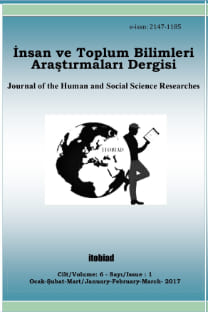Küreselleşmenin KİT’lerin Ekonomideki Payına Etkisi
Küreselleşme, KİT’ler, Özelleştirme, Devletin büyüklüğü, Etkinlik
The Impact of Globalization on the Economic Share of SOE’s
Globalization, SOE’s, Privatization, Size of the State, Efficiency,
___
- Abramov, A., Radygin A. ve Maria Chernova (2017). State-owned enterprises in the Russian market: Ownership structure and their role in the economy. Russian Journal of Economics, 3 (2017), 1-23.
- Armstrong, P. (2015). How improvements in SOEs can help emerging markets address their development challenges. State-owned Enterprises Commentary, Spring 2015, http://www.ifc.org/wps/wcm/connect /1299668047f4ee8bae58ff299ede9589/EB_IFC_Phil_Armstrong.pdf?MOD=AJPERES.
- Bance, P. and G. Obermann (2015). Serving the general interest with public enterprises: new forms of governance and trends in ownership. Annals of Public and Cooperative Economics, 86, 529-534.
- Bernier, Luc ed. (2015). Public Enterprises Today: Missions, Performance and Governance, learning from fifteen cases, CIRIEC Collection “Social Economy & Public Economy”, No.5
- Bernier, L. (2014). Public enterprises as policy instruments: the importance of public entrepreneurship. Journal of Economic Policy Reform, 17(3), 253-266.
- Büge, M.; Egeland, M.; Kowalski,P. ve Sztajerowska, M. (2013). State-owned enterprises in the global economy: Reason for concern?, CEPR’s Policy Portal, inequality. [Online] at http://voxeu.org/article/state-owned-enterprises-global-economy-reason-concern, accessed January 15th, 2017.
- Christiansen, H. (2011). The Size and Composition of the SOE Sector in OECD Countries. OECD Corporate Governance Working Papers, No. 5, OECD Publishing, Paris. [Online] at http://dx.doi. org/10.1787/5kg54cwps0s3-en
- Clò, S., C.F. Del Bo, C. F. , Ferraris, M, Fiorio, C., Florio, M., Vandone, D. and C. Fiorio (2015). Public Enterprises in the Market for Corporate Control: recent worldwide evidence, Annals of Public and Cooperative Economics, 86, 559-583.
- Dewenter, K. L. & Malatesta, P. H. (1996). Public Offerings of State-Owned and Privately-Owned Enterprises: An International Comparison, http://www.afajof.org/SpringboardWebApp/userfiles/afa/file/Supplements%20and%20Data%20Sets/Appendicies%20for%20Public-Offerings%20of%20 State-Owned%20and%20Privately-Owned%20Enterprises%20An%20 International%20Comparison%20ap5080(1).pdf, accessed June 15th, 2016.
- Haggarty, L. ve Mary M. Shirley (1987). A New Data Base on State-Owned Enterprises, The World Bank Economic Review, 11(3), 491-513.
- Hemming, R. and Mansoor A.M. (1987). Privatization and Public Enterprises, IMF Working Paper, WP87/9.
- Forbes Global 2000, (2017), The Worlds Biggest Public Companies, https://www.forbes.com/global2000/list/#tab:overall, accessed September 1st, 2017.
- Kowalski, P., Büge, M., Sztajerowska, M. and Matias Egeland (2013). “State-Owned Enterprises: Trade Effects and Policy Implications”, OECD Trade Policy Papers, No. 147, OECD Publishing. http://dx.doi.org/10.1787/5k4869ckqk7l-en
- Nunnenkamp, P. (1986). State enterprises in developing countries, Intereconomics, ISSN 0020-5346, 21(4), 186-193, http://dx.doi.org/10.1007/BF02925384
- OECD (2014). Workshop on State-Owned Enterprises in the Development Process. https://www.oecd.org/daf/ca/Workshop_SOEsDevelopmentProcess _Brazil.pdf
- Smith, D.A.C. & Trebilcock M.J. (2001). State-Owned Enterprises in Less Developed Countries: Privatization and Alternative Reform Strategies, European Journal of Law and Economics, 12: 217-252. https://doi.org/10.1023/A:1012817825552
- Sturesson J., McIntyre S., ve Jones, N. (2015). State-Owned Enterprises Catalysts for public value crieation. https://www.pwc.com/gx/ en/psrc/publications/ assets/pwc-state-owned-enterprise-psrc.pdf.
- TC Hazine Müsteşarlığı (2016). Kamu Sermayeli Kuruluş ve İşletmeler İstatistikleri, https://www.hazine.gov.tr/tr-TR/Istatistik-Sunum-Sayfasi?mid=60&cid=14&nm=299, accessed August 15th, 2017.
- ISSN: 2147-1185
- Yayın Aralığı: 4
- Başlangıç: 2012
- Yayıncı: Mustafa SÜLEYMAN ÖZCAN
Yılmaz BAYAR, MAHMUT ÜNSAL ŞAŞMAZ, ÖMER FARUK ÖZTÜRK
MİNE NUR BOZDOĞAN, GONCA BIYIK
Helal Turizm Eğilimleri: Kastamonu İlinde Bir Uygulama1
Vergi Affı Uygulamalarının Vergiye Gönüllü Uyum İle İlişkisi: Iğdır İli Üzerine Bir Araştırma
AHMET TEKİN, ÖZLEM SÖKMEN GÜRÇAM
Helal Turizm Eğilimleri: Kastamonu İlinde Bir Uygulama
NAMIK HÜSEYİNLİ, Selvi GÖÇMEN, Namık Hüseyinli danışmanlığında HAZIRLADIĞI
Bir Finansman Kaynağı Olarak Vakıflar: Osmanlı Örneği
Türkiye Basketbol Liglerinin Rekabet Yapisi Ve Spor Endüstrisi İle İlişkisi
OĞUZ KARA, MENSUR PEHLİVAN, KADİR TİRYAKİ, M Ali BAYHAN, Sport INDUSTRY
Engelli Çalışma Kültürünün Cinsiyet Bağlamında Değerlendirilmesi1
Selvi GÖÇMEN, NAMIK HÜSEYİNLİ, Selvi GÖÇMENİN, Namık Hüseyinli danışmanlığında HAZIRLADIĞI
